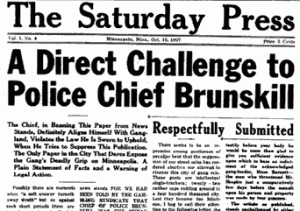Freedom of the press is a base principle in our society. However, this freedom was challenged by the government until 1931 when the case of Near v. Minnesota proved that prior restraint (censorship on expression before the expression actually takes place) is unconstitutional.
The Saturday Press was created and run by an anti-Semitic man, Jay M. Near, and a man named Howard A. Guilford, out of Minneapolis. The two wrote an article stating that Jewish gangs were basically running the city, accusing the Police Chief Frank Brunskill (as shown in picture above) of police brutality.
Another man they wrote negatively about was Floyd Olson, who later would become governor. He did not take kindly to these articles and filed a complaint about the Saturday Press, bringing the two men to Hennepin County District Court, citing the Public Nuisance Law of 1925.
This law claimed this press was a public nuisance due to publishing or selling “a malicious, scandalous and defamatory newspaper.”
Olson used Near’s anti-Semiticism against him, regarding his belief in Jewish gangs, something the court agreed with. The judge, Matthias Baldwin issued a temporary injunction on the press, halting all circulation and publishing.
The pair were then taken to the Minnesota Supreme Court on appeal.
The court felt that restricting the publication given the fact that it was producing harmful material to the public was perfectly constitutional to preserve public morals.
Being taken back to the District Court, Judge Baldwin ultimately decided to ban the two from creating the Saturday Press and any other press that produced any malicious or scandalous news. This time, Near, alone, appealed this and was again brought to the Supreme Court.
The Supreme Court ultimately decided that censorship was unconstitutional and that freedom of the press deserved to be allowed for the Saturday Press.
“For these reasons we hold the statute, so far as it authorized the proceedings in this action under clause (b) [723] of section one, to be an infringement of the liberty of the press guaranteed by the Fourteenth Amendment. We should add that this decision rests upon the operation and effect of the statute, without regard to the question of the truth of the charges contained in the particular periodical. The fact that the public officers named in this case, and those associated with the charges of official dereliction, may be deemed to be impeccable cannot affect the conclusion that the statute imposes an unconstitutional restraint upon publication.” – Supreme Court decision


Leave a response